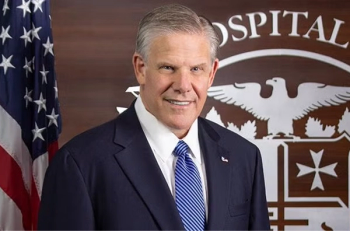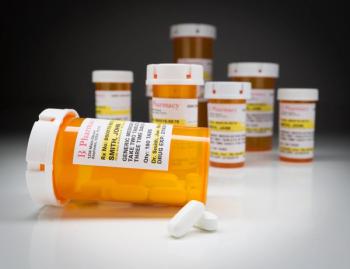
Congress passes $1.5 trillion spending plan: What it means for healthcare
The Senate passed the omnibus bill and President Biden plans to sign it. The package includes key provisions on telehealth, research programs and other areas of note for hospitals.
Congress has signed off on a $1.5 trillion spending plan that offers spending increases for healthcare programs, medical research and important extensions for telehealth services.
The Senate signed off on the
The American Hospital Association said it was pleased with the provisions for healthcare, including the provisions for telehealth, maternal health and the 340B drug discount program for hospitals. Research advocates lauded the inclusion of money to create a new federal agency to study cancer and other diseases.
But the AHA expressed disappointment that the package didn’t include a planned $15 billion for COVID-19 response efforts. Amid disputes in Congress, House Speaker Nancy Pelosi reluctantly pulled that from the package and said she hoped it’d be voted on separately.
“We will continue to urge Congress to provide additional support to hospitals and health systems and their front-line caregivers as we enter year three of the COVID-19 public health emergency,” the AHA said on its website.
Telehealth
Healthcare advocates cheered the spending plan for delivering provisions ensuring access to
Specifically, the legislation ensures about five months (151 days) of telehealth access after the end of the public health emergency.
Kyle Zebley, vice president for public policy of the American Telemedicine Association, said the provision is a step in the right direction. In a statement, Zebley said the package ensures “patients do not fall off a ‘telehealth cliff’ immediately after the COVID-19 public health emergency (PHE) ends.”
Medicare beneficiaries will be able to get telehealth services anywhere, including their home. Medicare will also cover audio-only services, which the ATA says is key to ensuring options for those without broadband access and video services.
The measure also expands the scope of practitioners who can participate in telehealth, including physical therapists and occupational therapists, the ATA says. In addition, providers will not be required to see patients in person before a telehealth visit.
Healthcare and industry groups will continue pressing lawmakers and the Biden administration for
Research
The package includes substantial increases for federal medical research programs.
The National Institutes of Health, the primary source of funds for biomedical research, will get $45 billion, a $2.25 billion increase.
It’s the seventh consecutive year the NIH gets an increase in spending, the Association of American Medical Colleges noted. The agency continues to enjoy strong support from Democrats and Republicans in Washington.
“Ongoing robust support for NIH-funded research directly benefits patients and families by enabling scientists at academic medical centers and other research institutions nationwide to advance new and better diagnostics, preventive interventions, treatments, and cures,” the AAMC said in a statement.
Biden will also be getting the
The package includes $1 billion to establish the Advanced Research Projects Agency for Health, dubbed ARPA-H. The White House has said this agency will focus on high-risk, high-reward projects to find breakthroughs in treatment for cancer and other diseases.
The National Cancer Institute, the prime source of federal aid for cancer studies, will get $6.9 billion, an increase of $353 million.
The National Science Foundation, a critical source of funds for basic research, would get $7.16 billion, a $351 million increase.
Key health programs
The U.S. Centers for Disease Control and Prevention would get $8.5 billion, an increase of $582 million. The CDC would get $8 million for a new pilot program looking at the social determinants of health, well below the $150 million initially proposed, the AAMC said.
The spending bill offers $200 million for a new funding stream to improve public health infrastructure and capacity. Lawmakers also approved increases in programs for preparedness programs to deal with future health emergencies.
The Health Resources and Services Administration would get $8.9 billion, an increase of $1.4 billion. It would include spending increases for HIV/AIDS, rural health and maternal and child health programs.
The Substance Abuse and Mental Health Services Administration would receive $6.5 billion, an increase of $530 million.
The Agency for Healthcare Research and Quality would get $350 million, an increase of $12 million. AHRQ’s mission is to improve the safety and quality of healthcare.
The spending package also includes more money for improving maternal health, which has been a priority for the Biden administration. The bill provides $110 million for 2023-2027 in various programs to improve maternal health, including grants for best practices, training and public education, according to the AHA.
In addition, the bill provides an additional $40 million over the next five years to improve maternal health in rural areas.
Cybersecurity
Hospitals will face more rigorous reporting requirements involving cyber attacks, a
Healthcare organizations must report any cyber incidents within 72 hours to the Cybersecurity and Infrastructure Security Agency, a division of the Department of Homeland Security, the AHA says. They must report ransomware payments to federal authorities within 24 hours.
Under current regulations, hospitals and healthcare organizations must report breaches affecting at least 500 people within 60 days. Hospitals will now have to alert federal authorities much more quickly.
Medical training
The Children’s Hospitals Graduate Medical Education program would get $375 million, a $25 million increase, according to the AAMC.
The National Health Service Corps would get $121 million, an increase of $1 million. The Rural Residency Program would get $10.5 million, the same as the program’s current budget, the AAMC says.
HRSA’s Title VII Health Professions Health Professions and Title VIII Nursing Workforce Development programs would get $799 million, an increase of $45 million, according to the AAMC.
340B program
Some hospitals will regain the ability to participate in the 340B program, which allows many hospitals to buy certain outpatient drugs at a discount. Eligible hospitals must serve a high volume of patients with low incomes and those in underserved communities.
Under the spending plan, certain hospitals that participated in the 340B program but lost eligibility in 2020 and 2021 can again participate in the program, the hospital association says. To qualify, hospitals must have been taking part in the 340B program the day before the public health emergency began and will have to show their eligibility was affected due to the COVID-19 emergency.
The 340B program and its scope have been the source of
FDA
The Food and Drug Administration would get $3.3 billion, an increase of $102 million, or 3.3%.
Research!America, an advocacy group for health and scientific studies, said it was glad to see the agency get more aid but said the FDA remains “underfunded.” The FDA oversees $2.8 trillion in products used by all Americans, the group noted.
“On a bipartisan basis, members of Congress responded to the need for more funding, and we look forward to working with the Administration and Congress to assure robust resources for this agency going forward,” Research!America said in a statement.






























